Six Surprising Reasons You’re Not Sleeping Well & What to Do About it


If you’re a woman over fifty, you know that sleep can sometimes be elusive. It can for me! Today, I’m looking at some of the typical reasons that midlife women are not sleeping well, and I’m diving even deeper. As I looked into it, I found six reasons for sleep problems that came as a surprise to me. I couldn’t wait to share them with you! Let’s jump right into it!
Not Sleeping Well? What Exactly Does That Mean?
Clinically speaking, insomnia can be trouble falling asleep or staying asleep. ???? But you may be surprised to learn that, for an official diagnosis of insomnia, you would have to be sleepless three nights a week for three months! ????
To feel rested and alert, adults typically need to sleep between six and nine hours. But for sleep experts, the actual defining factor for insomnia isn’t the number of sleep hours, but rather, fatigue. If you’re not fatigued during the day, you’re probably getting enough sleep for you, regardless of how long you’re sleeping.
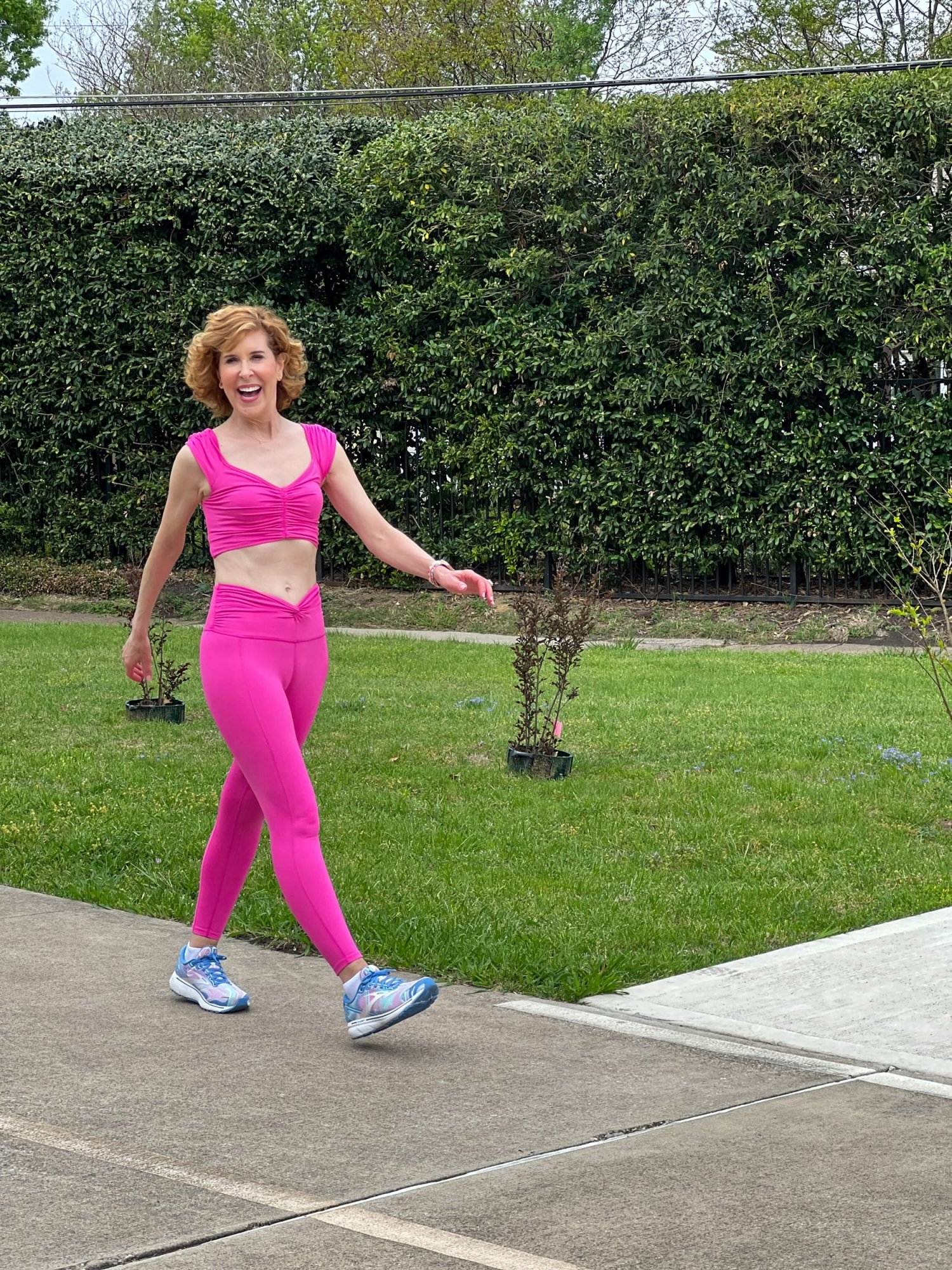
How to Lose Weight
When You’re Over 50
Already a subscriber? Enter your email – you won’t be subscribed twice!
Not Sleeping Well? Typical Reasons Why
If you’ve done any reading at all on the subject, you’re probably familiar with many of these—but a little review won’t hurt, right? ????
Caffeine Consumption
If you want to be able to fall asleep, you know that you need to limit caffeine consumption in the afternoons and evenings. What you may not realize is that you may be consuming caffeine from sources like chocolate or iced tea as well as the typical coffee and soft drinks. The standard recommendation is to cut off caffeine 4-6 hours before bed. But since everyone metabolizes caffeine at different rates, experts say you may need to stop it even earlier than that (like noon! ????) if you’re struggling to sleep.
Hot & Flashy
If hot flashes are waking you, try moisture-wicking sheets and jammies. A few years ago, Oprah included Karen Neuburger pajamas in her annual Oprah’s Favorite Things Holiday Gift Guide. I tried them and found that I love them too! They’re reasonably-priced, made of soft 60% cotton/40% polyester for moisture-wicking, and they come in beautiful, modest, and feminine designs! You can check them out HERE or HERE. You can also try using a buckwheat pillow. They’re typically cooler than down or latex pillows.
There’s a Nap for That
If you’re a napper, be sure you’re not napping too late or too long. I take a nap every day, but I take it at 1 p.m., and for 30 minutes, max. (It’s been such a help in combating the fatigue that comes along with my auto-immune disease.)
Blue Light Special
You’ve probably heard to turn off electronics an hour or so before bedtime. They emit a blue light that suppresses melatonin, the sleep-inducing hormone. But blue light even three or four hours earlier is enough to delay melatonin production. To combat this, you can wear blue light glasses, or use a blue light blocking screen protector for your laptop. When it comes to your iPhone or iPad, try setting your screen to Night Shift in the evenings, which automatically adjusts the display colors to the warmer end of the spectrum and reduces blue light. Turn it on by going to Settings > Display & Brightness > Night Shift.
Awake? Get Up & Get Out
You don’t want your brain to start associating your bed with anything other than sleep (or romance ????), so if sleep is elusive, go into another room, and do something relaxing and calm (no screens) in dim light.
Medication Interference
Medications you’re taking can interfere with sleep. (Especially blood pressure medications, antidepressants, and steroids.)
 Not Sleeping Well? Surprising Reasons Why
Not Sleeping Well? Surprising Reasons Why
1. Let’s Have a Drink (or Not)
You probably know that a glass of wine can make it easier to fall asleep. But research shows that it also causes a rebound effect leading to lighter and more fragmented sleep in the second half of the night. Sleep experts recommend limiting alcohol to three to four hours before bedtime.
Also, watch your water intake in the hours before bedtime. Although a study out of Penn State found that adequate hydration enhances sleep, it also increases the number of times we need to urinate at night, causing sleep disruptions. Requiring more than one or two bathroom breaks at night is abnormal.
2. Easy Breezy Empty Nester Life
With no kids at home, you’re undoubtedly under less stress. ???? That can also mean that your schedule has more flexibility—which may not be good for your sleep. Experts say you should maintain a regular sleep schedule if at all possible.
I’ve been using the Bedtime function on my iPhone, and it’s helped! (You can find it on the clock app that comes on your phone. Look along the bottom and tap the “Bedtime” icon. Set the time you want to go to sleep and the time you want to wake up in the morning. Then tap the word “Options” in the top left corner. On the options page, you’ll indicate what days of the week you want to adhere to your schedule and when you want a bedtime reminder. You also have the option to toggle on the Do Not Disturb During Bedtime option, which I highly recommend. It will silence your phone and text notifications automatically during the sleep period you’ve selected. You don’t even have to set your phone to silent manually! It will also allow you to choose your wake up alarm. Pick one you like! I have mine set to “Early Riser,” which is gentle and makes getting up just a little bit easier! In the morning, it wakes you with your selected alarm, and the screen tells you the weather report for the day!
3. Winding Down Well
You may think you’re winding down before bed, but you may not be doing it well! Dr. John Herman, who founded the sleep disorder center at Children’s Medical Center in Dallas, says that you need to wind down about an hour to an hour and a half before bed. During your wind-down, only do things that are calming. That means no late-night talk shows. (Laughter releases endorphins, which wake you up instead of calming you.) Instead, try taking a warm bath (I use this in mine to help me relax.), stretching, reading something boring, or doing a monotonous activity.
4. Brain On Overdrive
I can be tired, but the minute I lay down, my mind starts going! Sure, writing a to-do list for the next day before bed is supposed to help, but it just seems to get my mind working on the next day in advance! Dr. Herman says that you should write out your to-do list for the next day at the beginning of your wind-down period. Once you’re finished, he recommends putting it in a drawer or another room for the night. One thing that helps me is to pray and think about literally handing my list over to the Lord to handle while I’m asleep. If He’s handling the things on my list, I don’t need to worry about them! ????
5. Worrying About Sleep
Worrying about not sleeping may very well be contributing to your sleeplessness! Many people have the belief that if they don’t get enough sleep, they won’t be able to function. But their history shows that they do fine during the day, so putting aside those anxieties can help.
I have this problem, but using the Bedtime function on my iPhone has helped me with this too. When I lay down to sleep, I find it helpful to do a little self-talk! ???? I tell myself that now is the time for rest, and just like there’s a time for eating, exercise, and work, this is the time for sleep. And then I don’t allow myself to look at the clock until morning. (That just gets my brain revved up again!) And if I can’t fall asleep, I tell myself that resting and being still is good for me too. Somehow, just relaxing my mind about the expectation of sleep helps.
6. Circadian Rhythms
Although we manipulate our sleep/wake habits by using everything from caffeine to blue light exposure, the truth is that God made our bodies with circadian rhythms that naturally respond to dark and light. It’s pretty amazing! Our body’s master clock is controlled by the suprachiasmatic nucleus (SCN), a tiny region of the brain in the hypothalamus, located directly above the optic nerve. It’s responsible for controlling circadian rhythms and signaling the body to produce melatonin, a hormone that makes you sleepy.
If you’re not sleeping well, be sure you’re exposing yourself to light in the morning, you’re physically active during the day, and that your room is dim at night when you’re winding down.
Not Sleeping Well? The Latest Treatments
If sleep is still elusive, here are a few other things to try.
No More Meds
Medications like Lunesta, Ambien, and Sonata are no longer the first-line treatment among sleep experts. Increasingly, physicians are recommending Cognitive Behavioral Therapy for Insomnia (CBT-I) as the first approach. This short-term psychotherapeutic treatment helps you reset your mindset and behavior to nudge your body’s sleep-wake system into sync. To find a sleep specialist in your area, click HERE.
There’s an App for That
Want to try the DIY approach to CBT-I? An app like Sleepio that can help guide you through a 6-week professionally developed and clinically tested sleep improvement program.
Sedating Stories
In recent months, Calm, a popular meditation app ($13/mo.), added the option of a Sleep Stories category—with more than 140 soothing recordings of stories like The Little Mermaid and The Velveteen Rabbit! The stories are narrated by the likes of Matthew McConaughey, LeVar Burton, and Joanna Lumley. Another option? Ask Alexa to ready you a bedtime story or request that she play you a downloaded audiobook. (Try Bedtime Stories for Grownups by Ben Holden.) Some popular podcasts like Nothing Much Happens and Bore You to Sleep also offer soothing stories to keep the heart rate slow and brain activity low. (How ’bout that rhyme?! ????)
Want to Know More?
I read a lot of articles on sleep as I was researching this post! If you want to know more, this article from BrainAndLife.org was easily the best I found. Although it’s focused on sleep issues for those with neurological conditions, it’s full of excellent general sleep information as well.
Do you struggle with sleep issues? What’s worked for you? I’d love to know your best sleep tips, so leave me a comment and fill me in, okay?
Nightgown (under $20) | Faux Pearl Earrings | Apple Watch | “Blessed” Coffee Mug | Lipstick | Storming the Gates of Heaven by Anne Graham Lotz | Kindle Paperwhite | Pink Leather Kindle Cover
This soft nightgown is so sweet and cozy, and I loved that it came with removable cups (kind of like the ones in a bathing suit) for modesty and light support. We took these photos right after our big master suite redecorating project was finished, and I wanted something simple that wouldn’t interfere with the busy, joyful fabrics we used! (For more on our Empty Nester Master Suite Transformation, click HERE.)
Also, after writing this, I realized that pretty much everything in these pictures is the antithesis of the advice in this post! My room is light, and I’ve got books, electronics, and a coffee mug on the bed! (Not to mention the fact that I’m in full makeup!) ???? Sorry about that!!!
Blessings,
Photos by Megan Weaver.
P. S. Be sure to Pin this post on Pinterest for future reference! (And please follow Empty Nest Blessed while you’re there!)
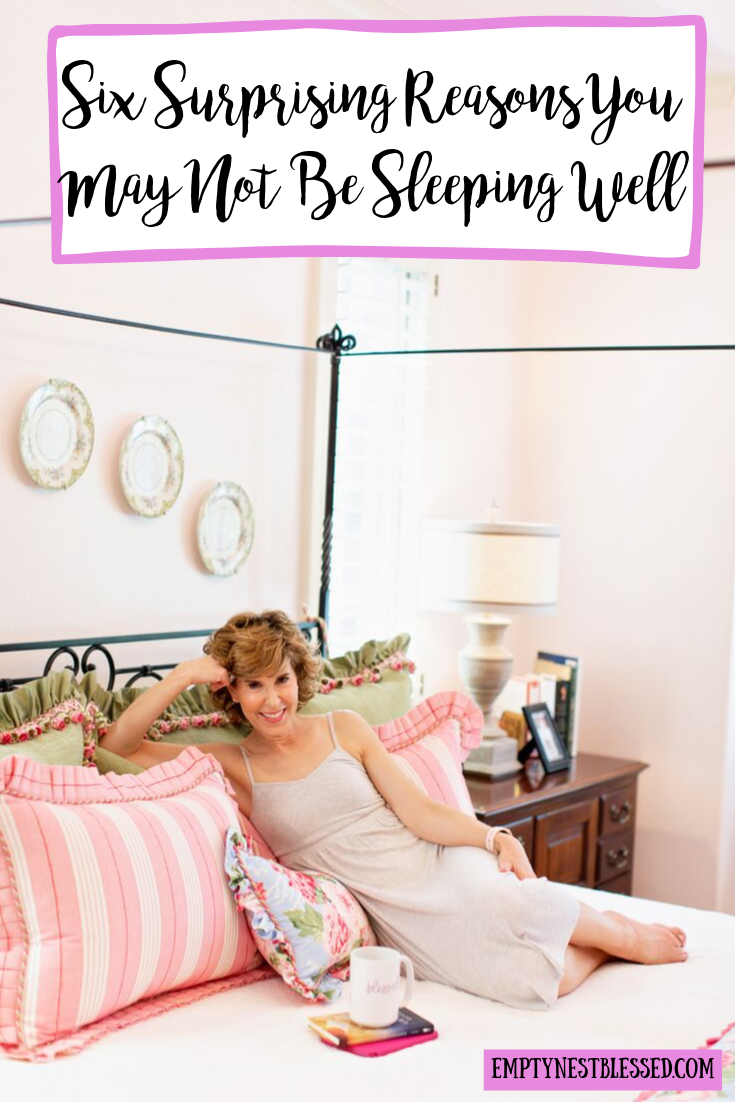






 Not Sleeping Well? Surprising Reasons Why
Not Sleeping Well? Surprising Reasons Why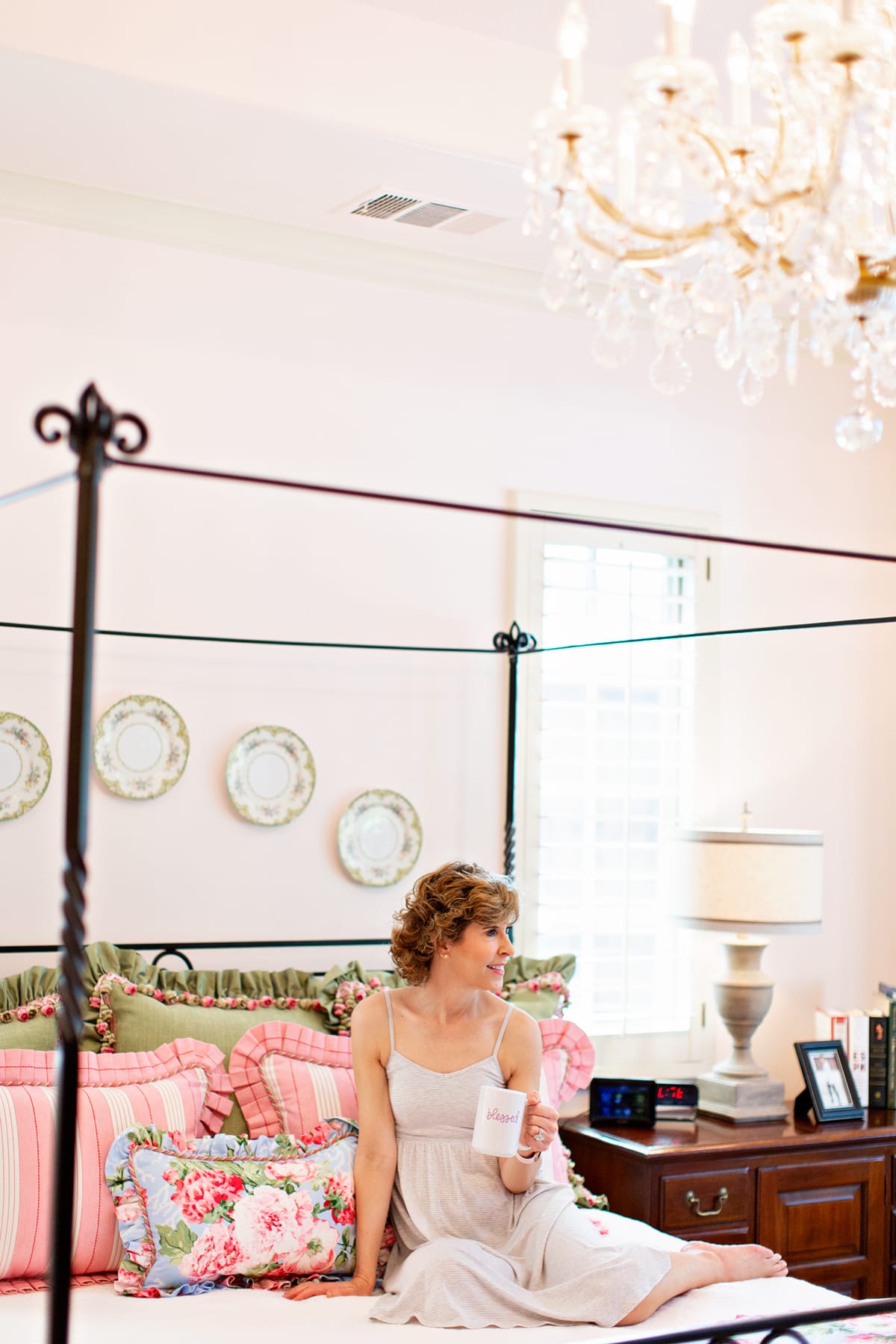
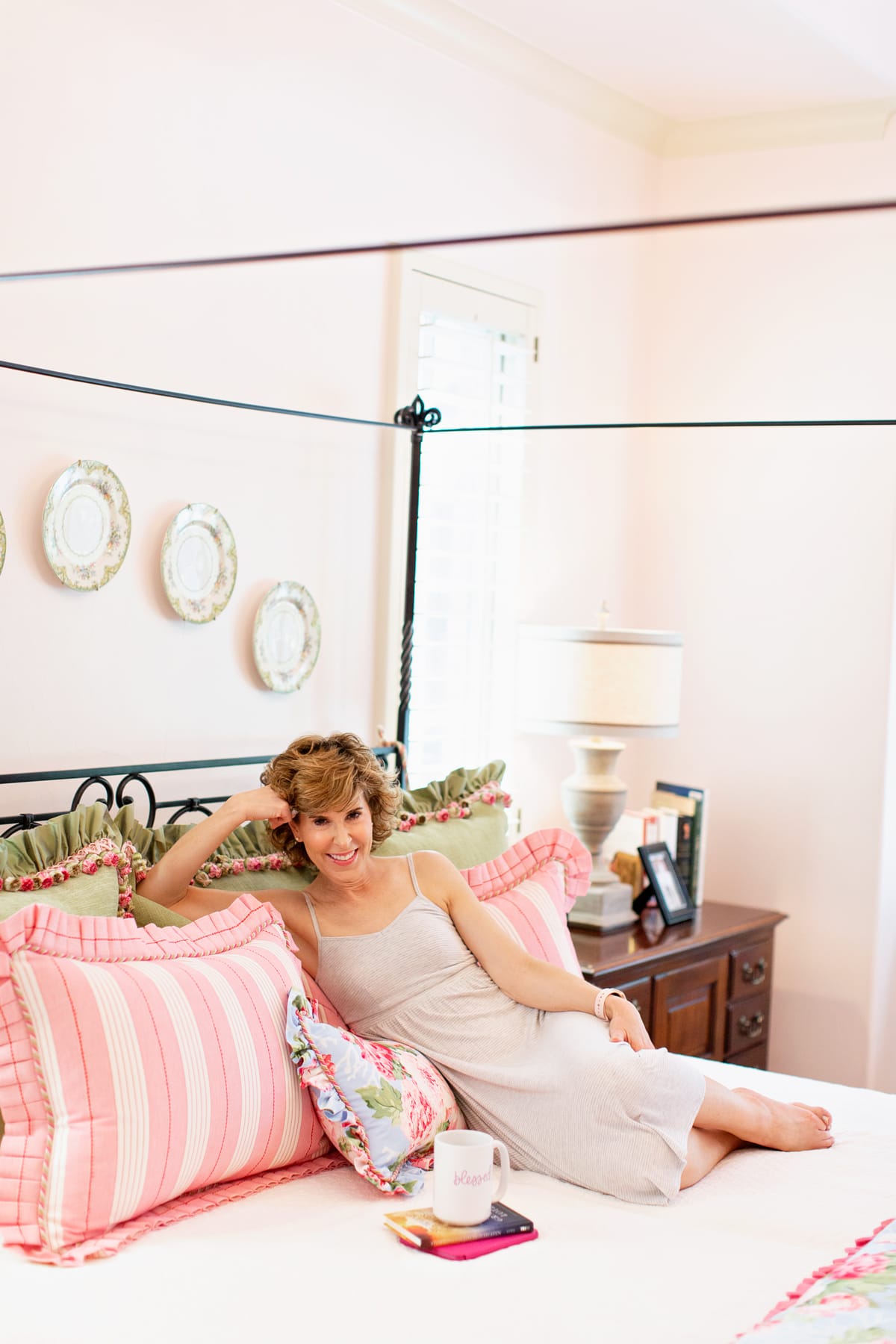


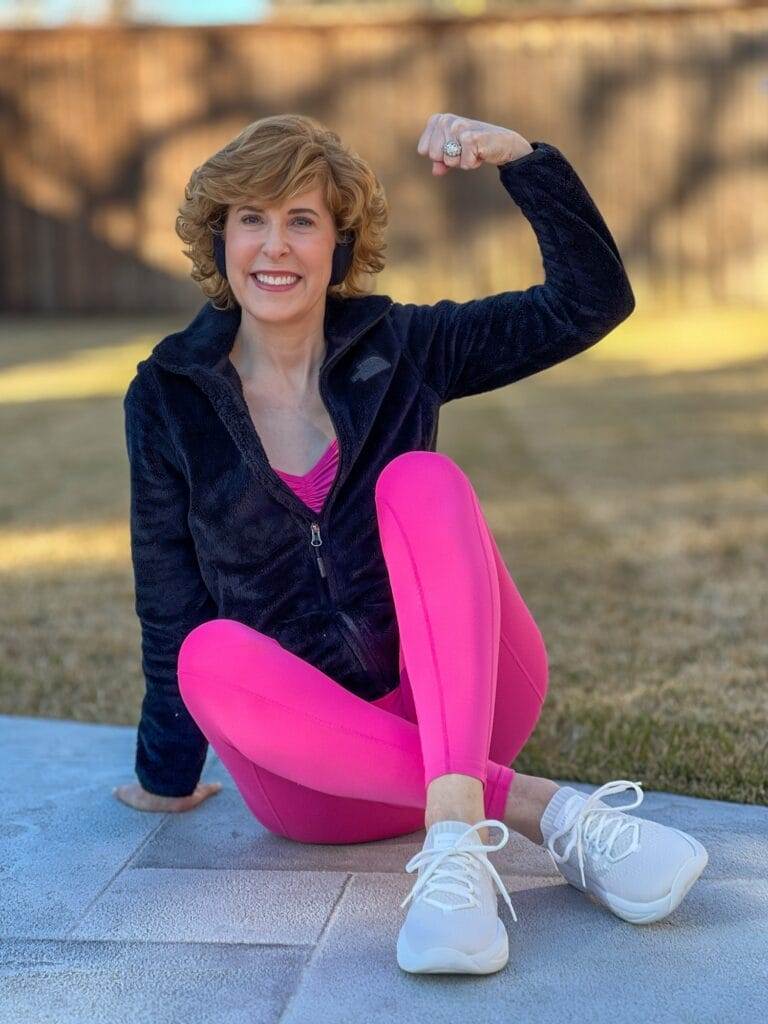



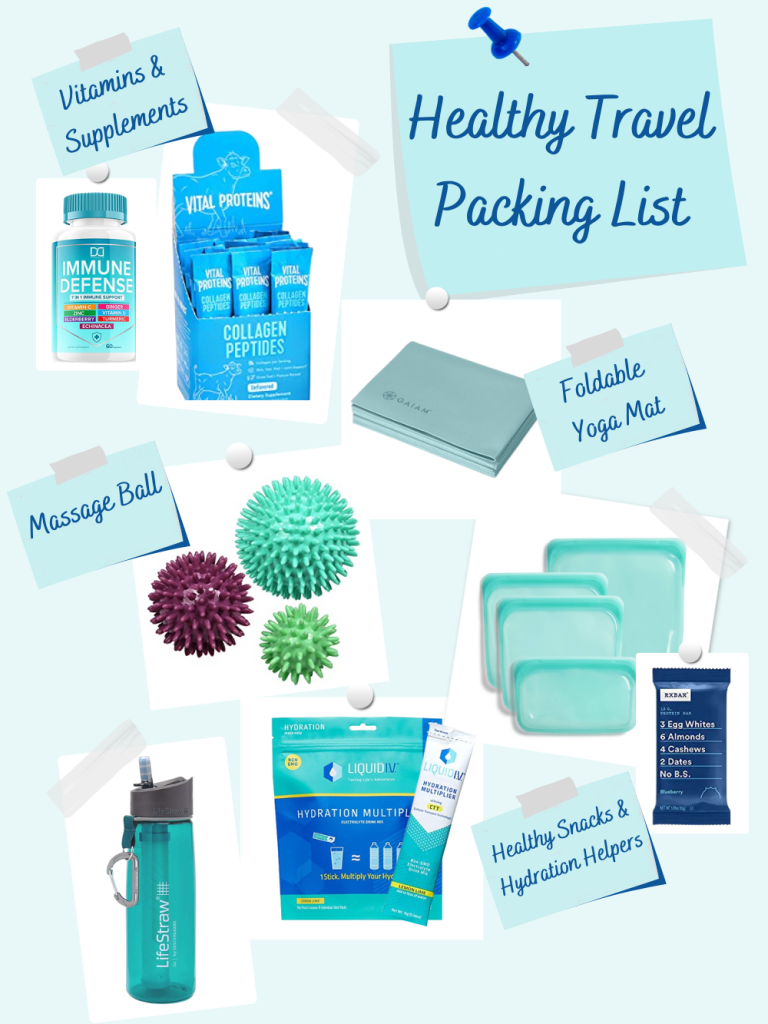















Fibromyalgia causes me not to be able to sleep well. I appreciate your suggestions. I do not want to do meds as other health issues are there.
I have found that reading before bed does help.
But there are nights when sleep eludes me until about 2-3 AM but I welcome anytime I can get some sleep.
Thank again.
Maureen,
I am so sorry to hear of your struggle. The article I referenced near the end of this post has some helpful suggestions and things to say about people who have sleep disruptions due to pain. (Read it here: https://www.brainandlife.org/articles/for-people-with-neurologic-conditions-sleep-can-be-elusive-we/) It can be a vicious cycle because lack of sleep can make your pain tolerance worse, so more pain=less sleep=more pain. When I struggle with muscle pain due to inflammation, I find that an Epsom salt bath with this (https://rstyle.me/+KJPq39QZCipQRKTspbu0iQ) soothing add-in before bed can help.
I hope you find it helpful. Thanks for your comment. Hugs to you, sweet Maureen.
xoxo
Suzy
Hi Suzy! Such a great post. I’ve set my phone up with the bedtime settings and am looking forward to using it. We moved to Ohio from Arizona less than two months ago and we’ve struggled with the time change more than anything. For one thing, Arizona doesn’t participate in daylight savings so we would just go to bed shortly after the sun went down and wake up with the sun. In the summer that was about 5 in the morning! No problem! But here, further north and with daylight savings, the sun comes up much later and goes down later. It’s done a number on us! But now I know why! Our circadian rhythm needs to be adjusted! And I guess that takes time and regularity.
By the way, I sometimes use the nighttime stories on another app called Abide. It’s similar to calm but teaches and programs Christian meditation. They have bible stories for bedtime!
Sleep well!! ????
Kay,
I can only imagine the number that Arizona to Ohio situation has done on you. When we have Daylight Savings Time, it takes me like 2 weeks to adjust!!! You are correct in that everything I read about circadian rhythm indicated that adjustments take weeks rather than days!
I am SOOOOO excited to know about Abide! It sounds like I would love it and I will check it out TONIGHT! Thank you so much for sharing it with us.
You are such a blessing!
xoxo Suzy
We just assumed you had recently awoken from a restful night’s sleep!
Marie,
Hahaha! What a relief. I mean, because that is EXACTLY how I look when I wake up in the mornings! ????????????
Thank you for giving me a good laugh!!!
xoxo
Suzy